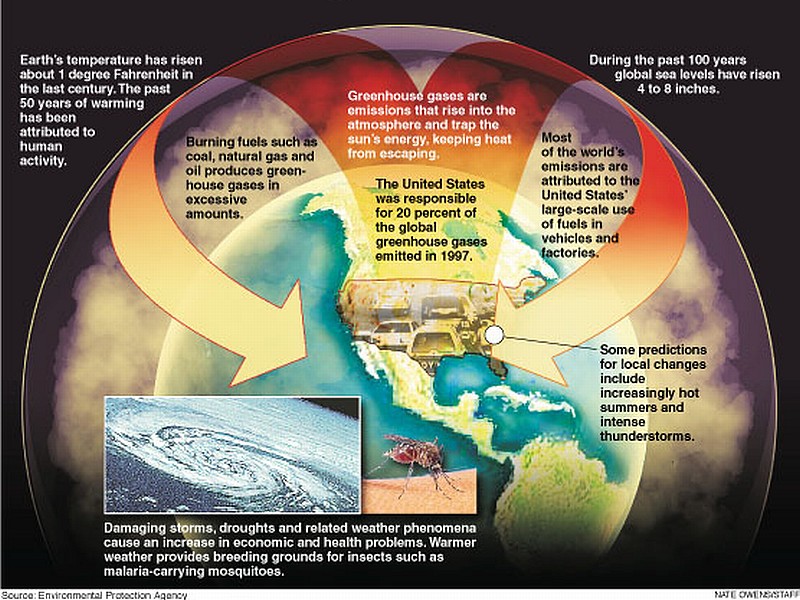Global Warming
Edited by Andy Ross
Compilations of mean global temperatures suggest a pattern of warming
amounting to about 0.9 K over land in the past half century. To most
scientists, this is convincing. A new study provides further evidence that
the numbers are probably about right.
The uncertainty arises mainly
because historical records are patchy and often contain inconsistencies. The
data must be homogenized to extrapolate a global average. To reduce
uncertainty, NASA and the National Oceanic and Atmospheric Administration
(NOAA) publish their data and algorithms. A British collaboration known as
Hadley CRU is doing so too.
The Berkeley Earth group in California
aims to provide a single online databank of all temperature data and
analysis and to encourage more scientists and statisticians to test the
existing analyses. The group uses an algorithm to deal with awkward data
that weights data points by their consistency with comparable readings and
builds up a compilation going back to 1800. A technique known as kriging
uses spatial correlations in weather to estimate temperatures between
weather stations to provide more nuanced heat maps.
The Berkeley
Earth study shows that over the past 50 years the land surface warmed by
0.91 K. The work is due to be published online with a vast trove of
supporting data. It may convince more skeptics that the world is warming.
Climate Scientists Caught Lying and Cheating Again
The Telegraph, October 30, 2011
Ten days ago, Professor Richard Muller of Berkeley University, California,
said that thanks to research from his Berkeley Earth Surface Temperatures
(BEST) project, he was sure the planet has warmed by 0.9 K since 1950. On
BBC Radio 4, he said: "In our data, which is only on the land, we see no
evidence of [global warming] having slowed down."
But he's wrong. A
chart produced by the Global Warming Policy Foundation's David Whitehouse,
plotted from BEST's own figures for the decade 2001-2010, shows no warming.
BEST co-author Professor Judith Curry, who chairs the Department of
Earth and Atmospheric Sciences at Georgia Institute of Technology,
contradicts Muller: "There is no scientific basis for saying that warming
hasn't stopped. To say that there is detracts from the credibility of the
data, which is very unfortunate."
By William D. Nordhaus
New York Review of Books, March 22, 2012
Edited by Andy Ross
An opinion piece in The Wall Street Journal of January 27, 2012, by a group
of sixteen scientists, asserts that the globe is not warming, that dissident
voices are being suppressed, and that delaying policies to slow climate
change for fifty years will have no serious economic or environment
consequences. Six key issues are raised in the article.
1 Is the planet in fact warming?
Temperatures are rising, and they were higher in the last decade than they
were in earlier decades. The historical temperature series is highly
volatile. The last decade of temperature and stock market data is not
representative of the longer-term trends. The finding that global
temperatures are rising over the last century-plus is robust.
2 Are human influences an important contributor
to warming?
To test the performance of a climate model, modelers
input the changes in CO2 concentrations and other climate influences and
estimate the resulting temperature path, and compare the outcome with the
counterfactual case where there is no input for human-induced changes. This
experiment has been performed many times, to show that no climate model
using natural warming factors alone has reproduced the observed global
warming trend in the second half of the twentieth century.
3 Is carbon dioxide a pollutant?
The
question whether emissions of CO2 and other greenhouse gases will cause net
damages, now and in the future, has been studied extensively. A recent
survey finds a wide range of damages if warming is greater than 2 K,
including sea-level rise, more intense hurricanes, losses of species and
ecosystems, acidification of the oceans, as well as threats to the natural
and cultural heritage of the planet. The contention that CO2 is not a
pollutant is a rhetorical device.
4 Are
we seeing a regime of fear for skeptical climate scientists?
The idea
that skeptical climate scientists are being intimidated has no basis in
fact. No climate scientist has been expelled from the U.S. National Academy
of Sciences. There are controversies about many details of climate science
and economics. While some claim that skeptics cannot get their papers
published, working papers and the Internet are open to all. Nothing is being
suppressed.
5 Are the views of
mainstream climate scientists driven primarily by the desire for financial
gain?
The skeptics misunderstand the incentives in academic research.
Scientists who serve on panels of the National Academy of Science do so
without monetary compensation for their time and are subject to close
scrutiny for conflicts of interest. The attacks on the science of global
warming are reminiscent of the resistance by cigarette companies to
scientific findings on the dangers of smoking. Expenditures on all energy
goods and services are close to $1 trillion. Restrictions on CO2 emissions
large enough to bend downward the temperature curve from its current
trajectory to a maximum of 2 or 3 K would have large economic effects on
many businesses.
6 Is it true that more
carbon dioxide and additional warming will be beneficial?
The
skeptics’ summary is based on poor analysis. They cite the benefit-to-cost
ratio to support their argument, but the appropriate criterion for decisions
in this context is the difference between (and not the ratio of) benefits
and costs. My research shows that there are substantial net benefits from
acting now rather than waiting fifty years. The cost of waiting fifty years
to begin reducing CO2 emissions is $4.1 trillion at today's economy and
prices. The many uncertainties here do not imply that action should be
delayed. The claim that cap-and-trade legislation or carbon taxes would be
ruinous or disastrous to our societies does not stand up to serious economic
analysis.

